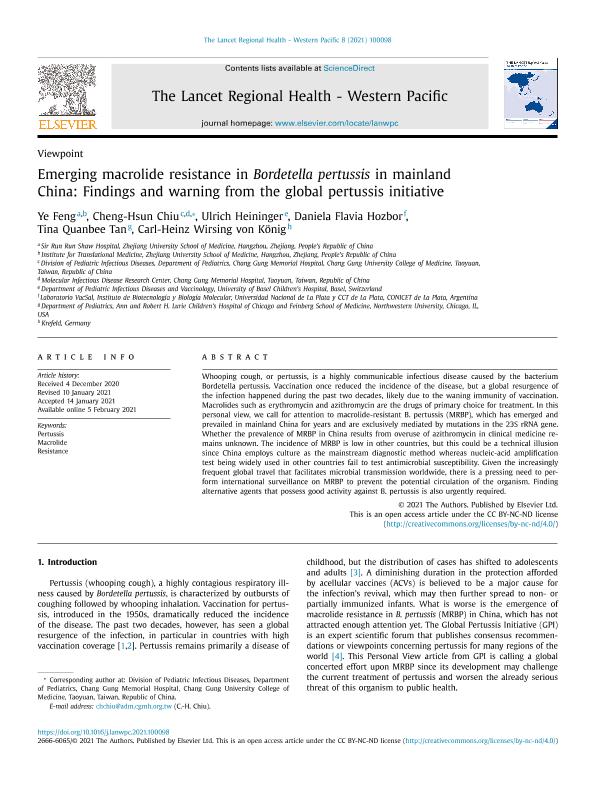Artículo
Emerging macrolide resistance in Bordetella pertussis in mainland China: findings and warning from the global pertussis initiative
Feng, Ye; Chiu, Cheng Hsun; Heininger, Ulrich; Hozbor, Daniela Flavia ; Tan, Tina Quanbee; von König, Carl Heinz Wirsing
; Tan, Tina Quanbee; von König, Carl Heinz Wirsing
 ; Tan, Tina Quanbee; von König, Carl Heinz Wirsing
; Tan, Tina Quanbee; von König, Carl Heinz Wirsing
Fecha de publicación:
03/2021
Editorial:
Elsevier
Revista:
The Lancet Regional Health - Western Pacific
ISSN:
2666-6065
Idioma:
Inglés
Tipo de recurso:
Artículo publicado
Clasificación temática:
Resumen
Whooping cough, or pertussis, is a highly communicable infectious disease caused by the bacterium Bordetella pertussis. Vaccination once reduced the incidence of the disease, but a global resurgence of the infection happened during the past two decades, likely due to the waning immunity of vaccination. Macrolides such as erythromycin and azithromycin are the drugs of primary choice for treatment. In this personal view, we call for attention to macrolide-resistant B. pertussis (MRBP), which has emerged and prevailed in mainland China for years and are exclusively mediated by mutations in the 23S rRNA gene. Whether the prevalence of MRBP in China results from overuse of azithromycin in clinical medicine remains unknown. The incidence of MRBP is low in other countries, but this could be a technical illusion since China employs culture as the mainstream diagnostic method whereas nucleic-acid amplification test being widely used in other countries fail to test antimicrobial susceptibility. Given the increasingly frequent global travel that facilitates microbial transmission worldwide, there is a pressing need to perform international surveillance on MRBP to prevent the potential circulation of the organism. Finding alternative agents that possess good activity against B. pertussis is also urgently required.
Palabras clave:
MACROLIDE
,
PERTUSSIS
,
RESISTANCE
Archivos asociados
Licencia
Identificadores
Colecciones
Articulos(IBBM)
Articulos de INST.DE BIOTECNOLOGIA Y BIOLOGIA MOLECULAR
Articulos de INST.DE BIOTECNOLOGIA Y BIOLOGIA MOLECULAR
Citación
Feng, Ye; Chiu, Cheng Hsun; Heininger, Ulrich; Hozbor, Daniela Flavia; Tan, Tina Quanbee; et al.; Emerging macrolide resistance in Bordetella pertussis in mainland China: findings and warning from the global pertussis initiative; Elsevier; The Lancet Regional Health - Western Pacific; 8; 3-2021; 1-4
Compartir
Altmétricas



